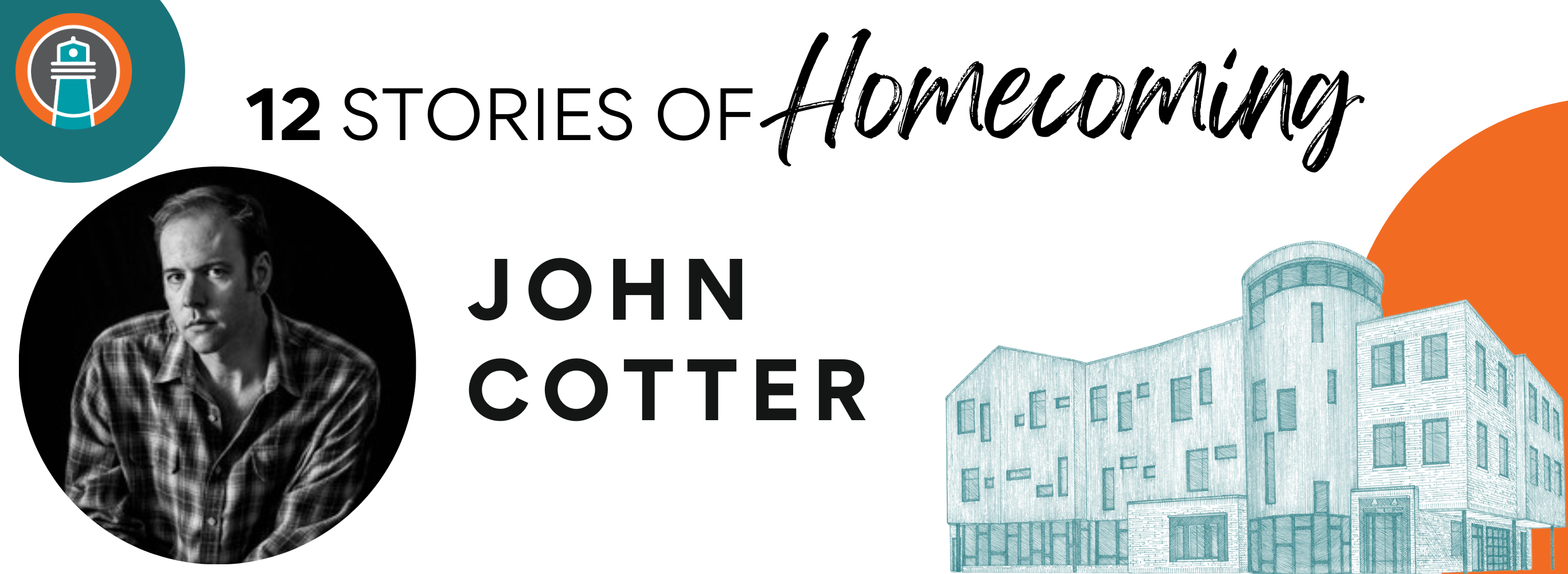
Editor’s Note: In June, Lighthouse moved into our new home. The 12 Stories of Homecoming is a series of stories written about creatives from all walks of Lighthouse that have made us who we are today. We are endlessly grateful for the support from our community and eager to welcome you home so we can open the doors even further, together.
John Cotter has been an anchor in the Lighthouse community for over a decade. His gentle, expert approach to teaching is both profoundly funny and intently serious, and his expertise in such a wide array of subjects always makes for a dynamic and instructive workshop.
“Lighthouse was my third writing home,” said Cotter. “I was moving from Boston, where I knew other writers in college, had a writing group, and was teaching at Grub Street. In Denver, I didn’t have that type of literary community to go to, and I was nervous to leave it.”
After a quick Google search, Cotter stumbled upon Lighthouse. “I luckily discovered that Mike Henry and Andrea Dupree had taught at Emerson College, where I’d studied, so I asked to be introduced. When I got to Denver, I met with Andrea, and I was welcomed to Lighthouse right away. I wore cowboy boots to the initial meeting, which I think helped.”
Cotter started teaching a weekend fiction class in early 2012 and never looked back. He’d regularly send emails to Dupree to tell her stories about his teaching journey, how impressed he was with the high level of work coming in, and how engaging everyone in the community was.
“For me, Lighthouse is and was a spiritual experience,” said Cotter. “These texts and stories—people have these rocks in their souls, and when we write, we get them out, then we workshop together and polish them and polish until they shine. We all write about the things that matter to us. We immediately get to see the genuine nature of someone through their writing. All small talk evaporates. We go right past the trees and straight into the forest. Lighthouse is about climbing through that wilderness together, and I felt so fortunate to be a part of it.”
For several years, Cotter taught a variety of subjects from memoir to fiction, to a class on Moby Dick and one on Infinite Jest. But in 2013, John started to experience a health crisis that would later become the subject of his memoir, Losing Music.
“It just took my whole life apart,” said Cotter. “A number of people in my life distanced themselves from me. I was teaching at a few different places, and most did not extend any flexibility. But that was never true of Mike and Andrea. And a few years later, it was never true of Genna Kohlhardt and Torin Jensen or anyone on staff at Lighthouse.”
Over the next few years, Cotter worked hard to find his new normal in teaching.
“The Lighthouse community really helped in that. Everyone was understanding. If I had to cancel a class last minute because I couldn’t see, or if someone had to drive me home, they were there. I wasn’t judged for having a disability.”
Cotter was reminded of a story that captured this support from Lighthouse.
“One evening, I was coming up the stairs at the same time a student was coming down, and a cup of coffee exploded all over my jeans,” said Cotter. “I suddenly needed new pants, and class was starting soon! I desperately found Genna, who jokingly said Mike might have a spare pair in his office. And by the time class started, I was sitting in a spare pair of Mike’s too-tight pants thinking the whole time, ‘Please don’t let me split these seams.’”
Cotter’s humor and ability to help individuals learn how to tell their story have touched many Lighthousers. In fact, only a few years after his diagnosis of Meniere's disease, he was awarded the Beacon Award for Teaching Excellence in 2018, awarded to an instructor based on student recommendations and judged by a community panel.
“Lighthouse has given me the opportunity to do so many things,” shared Cotter. “I went on a residency Lighthouse ran at a transitional program in Fort Lyon. I was placed in a homeless shelter for a month to write and work with some of the residents. I met so many people who were like me but had only had worse luck. I got to teach several sections of a refugee class and have these wonderful encounters with people, some still learning English. Helping them write their stories was so revelatory.”
As Lighthouse’s programs in the community have grown, we’ve found time and time again just how powerful writing can be, not only for the people doing it but the people teaching it.
“It’s such a cliché to say that an organization changes lives,” said Cotter. “But Lighthouse has enabled those kinds of changes, both big and small. All kinds of things change our lives, but appreciation for art and love of art—being in its presence—this is not perception for life; it is life itself.”

